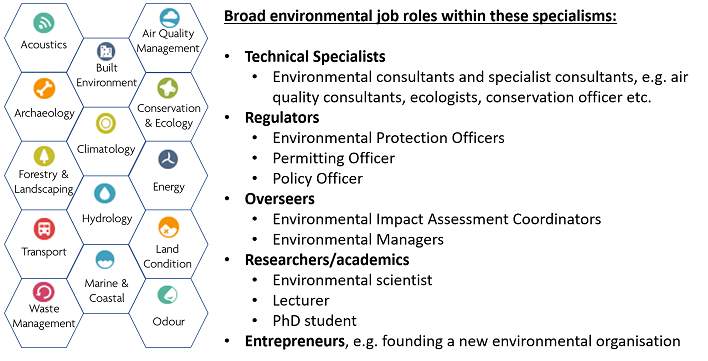Why work in the environmental sector?
The environmental sector is at the forefront of addressing global challenges, with environmental professionals and scientists playing an integral role in the transition to a sustainable society. This sense of purpose gives those working in the sector a high level of satisfaction, with our recent Salary Survey showing that 85% of members find their work meaningful and believe that they provide a positive contribution to society and/or the environment.
The environment consists of interlinked natural cycles, made up of self-regulating feedback loops, keeping systems in balance and resulting in the ecosystem services that humanity relies upon for success. Society is embedded within the environment and tackling social issues is deeply interlinked with ensuring effective environmental protection and management. The interconnectedness of the environment and its components is reflected in the diversity of careers within environmental science, with possible job roles spanning disciplines and sectors. Building a career in the environmental sector will therefore give you the opportunity to engage and collaborate across disciplines, addressing cross-cutting issues as diverse as improving air quality, biodiversity loss and regenerating contaminated land.
An increase in environmental legislation has also led to a greater number of job opportunities. Likewise, the current political climate in the UK, such as the drafting and adoption of new environmental legislation post-Brexit and working towards the net zero-carbon 2050 target, outlines the need for environmental expertise. The increased public interest in environmental issues has also led to greater investment in sustainable development and renewable energy and many organisations now conduct sustainability audits and have detailed Corporate Social Responsibility initiatives. The job market in the environmental sector is therefore set to continue growing,
What type of skills and experience will make me stand out?
The diverse nature of the environmental sector means that there are many ways that you can develop skills and experience that will stand you in good stead for building a career in the sector. Key attributes of environmental scientists include being system-level thinkers, lifelong learners and adaptive workers. Developing soft skills, such as presentation skills, playing an effective role in meetings and networking skills will also be extremely useful as they are widely valued in professional settings. Make sure to frame your experience and skills to fit the job description, and don’t be afraid to include experience not directly related to the role if it helps you demonstrate transferrable skills and knowledge!
If you are a student, being on an IES-accredited course is a great place to start building your career in the sector. Being an active student and supplementing your degree with extracurricular activities, such as joining university societies and contributing to university publications, will help you gain relevant skills and experience and will highlight to employers your genuine interest in the sector. Degree courses with integrated work placements or years in industry are fantastic ways to gain experience of the professional sector alongside your studies whilst being supported by your university.
The area of environmental science that you want to work in will influence the type of experience that is most relevant to you. If you would like to pursue a career within conservation and ecology, gaining field experience and taking part in citizen science initiatives will be especially useful. For a career in environmental consultancy, undertaking a short term placement, work shadowing, or networking with professionals in the sector are all invaluable opportunities to get to know the variety of consultancy roles and how best to become an ideal candidate for one. Research and academia is also a key field within environmental science, where it’s never too early to pursue publishing your research or seek out collaborative research opportunities with industry. As so much of environmental science knowledge and experience is transferrable across the sector, you do not need to have clear career aspirations in order to start getting experience. In fact, gaining any experience will help you discover which particular areas of the professional sector might interest you the most.
Volunteering and internships can be challenging to secure, even more so during this current climate, so exploring alternative avenues to gain experience of and engage with the sector is important too. This can include attending online events and forums for networking and learning, signing up for online courses, such as Massive Open Online Courses focussed on environmental science, or looking for local independent opportunities to engage in citizen science projects. Joining a charity board or committee can also be a great way to learn more about the sector and network with professionals in the area.
Why join a professional body?
Being a member of a professional body doesn’t just look great on your CV; it gives you access to a huge range of member benefits that help you gain sector specific knowledge, network with fellow professionals, and boost your employability.
Employers are always looking for ways to distinguish between applicants, and membership of a relevant professional body is increasingly being listed on job descriptions as an essential or desirable characteristic as it demonstrates to potential employers that you are both committed to the environmental science sector and proactively taking steps to further your career within it.
Professional bodies have a range of opportunities available that all help to boost your employability as it can be challenging to find sector-specific careers guidance outside of formal education settings. The IES has a number of careers services, including a mentoring scheme and CV clinic, to make sure you can receive current, relevant, and useful guidance for pursuing your career in the sector. You can receive first-hand, tailored advice from professionals in your desired area to find out how the sector works, what you need as a candidate, and how to secure your dream job.
In addition to the bespoke careers services, professional bodies provide opportunities to learn and network. Through events, such as conferences, workshops and webinars, you can engage with professionals and make important connections, supporting you in finding out about progressing your career. The IES has a bespoke network for Early Career professionals, holding events where attendees can learn about latest developments in the sector, network with people in a similar position to themselves, share and tackle any common challenges, and have the chance to practice soft skills, such as presentations, within the small and welcoming group. Professional bodies will also typically publish resources and other academic materials. The IES publishes the environmental SCIENTIST journal quarterly, amongst other reports and pieces of analysis throughout the year. These can be an ideal chance to have one of your pieces of research published and start to forge your career path.
Whether you are at the beginning, in the middle, or nearing the end of your career, professional bodies have services and resources that can help your professional development and career progression.
What types of jobs are available in the sector?
The environmental sector is constantly expanding, composed of multiple disciplines, fields, and specialisms. For this reason, there is a wide range of jobs available and many opportunities to find a niche aligned with your aspirations, interests and skill set.
Environmental scientist roles are available in nearly all sectors. Currently, over 60% of our members work in consultancy, with the rest in public and civil work, industry, academia, NGOs/charities and more, with a diverse range of opportunities within each of these areas. The graphic below depicts the range of specialisms our members work in and lists some broad job roles within the sector. Some roles consider the environment more holistically, taking into account a number of specialisms, such as Environmental Impact Assessors or Protection Officers, and some roles are far more focused on one particular area, such as Air Quality Consultants or Conservation Officers. Reading job descriptions for different organisations or specialisms will give insight into the sort of roles you may be well-suited to; due to the diversity in the sector you are likely to find a role that interests you.
To help you forge your path in the sector, we will be signposting useful resources to learn more about the roles available and website to find your dream job. We will also be launching a new blog series, A Day in the Life of an Environmental Scientist, which will outline members’ career paths. We will include members working across the sector, in a range of roles spanning a number of different specialisms and organisations, to demonstrate the range of experiences within the environmental sector and the various paths you could take throughout your career. In the meantime, check out the resources and services currently available on the Careers Page to kickstart your career in the environmental sector.






